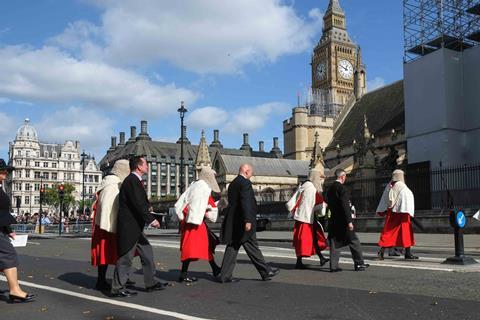When should judges defer to parliament in making the law?
How far should judges go in developing the law? Lord Lloyd-Jones, the Supreme Court justice who posed that question in a lecture published this month, had an answer within days. ‘Judicial involvement in policy-making is a bad idea,’ his opponents said last week. But were they right?

Lloyd-Jones, appointed to the Supreme Court last October, raised the issue in an academic lecture to the Conseil d’État in Paris. Analysing the sources of international law, he said it was accepted by common lawyers that judges had the power to make new laws.
But what, he asked, was their proper role in a common law system? ‘To what extent is it appropriate for judges to develop the common law in accordance with general principles of law and justice, as they see them, and to what extent should they defer to parliament in the matter of law reform?’
Lloyd-Jones noted that this was the subject of a ‘heated academic debate’ and referred to assertions by the Judicial Power Project, which is supported by the thinktank Policy Exchange, that ‘judicial overreach increasingly threatens the rule of law and effective, democratic government’.
‘There are, no doubt, limits to the judicial function in this regard,’ Lloyd-Jones acknowledged, adding that those limits were difficult to formulate with precision. ‘It does seem to me, however, that recent criticism in this regard of the conduct of the judiciary in our jurisdiction has been considerably overblown and the dangers of judicial activism greatly exaggerated.’
The latest attack on judicial law-making was not a direct response to Lloyd-Jones. Instead, the Judicial Power Project laid into a judgment delivered last July by his colleague Lord Reed, who is surely the favourite to succeed Lord Mance as deputy president of the Supreme Court in June and then to follow Lady Hale as president in 2020. Speaking for a seven-judge court, Reed had said that fees charged for access to employment tribunals were unlawful because they had the effect of preventing access to justice. It was a victory for Unison, the trade union that had brought the case against the lord chancellor.
Last week’s paper was written by Sir Stephen Laws, who retired as first parliamentary counsel in 2012. It is understandable that someone who has spent more than 35 years drafting legislation does not like to see it quashed. He accused the Supreme Court of claiming the right ‘to second-guess and overturn political policy decisions’ by reference to how they had turned out in practice. There had certainly been a much sharper reduction in the use of employment tribunals than ministers had expected when they introduced fees of up to £1,200 per claim. But why, he asked, should the lawfulness of the fees order have depended on the minister’s ability to predict the future?

In reality, of course, the outcome was not only predictable but widely predicted. As Laws acknowledges, part of the context for bringing in fees was that employers had come under pressure to settle claims brought by staff. Why give ministers a discretion if they are not required to exercise it wisely? And it is hardly plausible to argue that the government might still have introduced its own reforms more than two years after trying to kick widespread criticism into the long grass.
Laws responds with a much broader point about parliamentary sovereignty. ‘In the real-world constitution,’ he argues, ‘the main function of parliament is to bestow constitutional legitimacy on the policy and other actions of the executive.’ In his view, the Supreme Court had misunderstood the collaborative relationship between the government and parliament.
He may be on to something here. Courts are fond of attributing thought processes to parliament that have never occurred to anybody. Judges frequently declare that parliament ‘could not have intended’ an outcome that was well within the discretion it granted a minister.
But that does not make the judges unworldly. They are well aware that, particularly in areas of social policy, the likelihood of legislation is remote – even without Brexit dominating the political agenda. Most of the time, the connection between the government and parliament is not collaboration but control.
In fact, it is the relationship between the government and the judiciary that is one of collaboration. The courts correct errors by ministers. And if those ministers do not like the courts’ corrections, then – if Laws is right about their relationship with parliament – they can get the law changed.
That might have been more difficult in the Unison case because the fees order broke EU law. But it is a counsel of despair for Laws to claim that finding the ‘right’ level of fees is like trying to hit a moving target. Judges may not be any good at building fee structures. But they know when one is so lop-sided that it needs to be demolished.
joshua@rozenberg.net





























4 Readers' comments